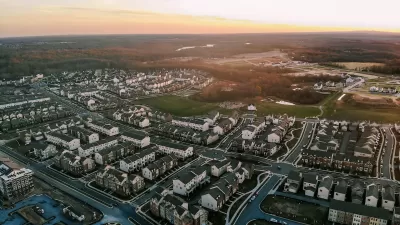Montgomery County just passed a slew of regulatory and legislative changes aimed at improving affordable housing. One writer suggests several more.

In a guest opinion piece published in Greater Greater Washington, Mike English describes the major changes to housing policy in Montgomery County that could pave the way for more affordable housing.
As English explains, “Faced with a tight budget and rising home prices, the County Council has looked for ways to increase tax revenue while reducing burdens on tenants, who make up over one-third of the county’s households.”
Among the steps the county took is a rent stabilization law, the first in the county in 40 years. “The new law caps rent increases at 6% each year, or 3% over the rate of inflation (whichever is lower), and allows landlords to “bank” any rent increases they don’t take advantage of for the following year.” The law starts applying to buildings 23 years after they’re built, in part out of fear that applying it to newer buildings would slow development.
Unfortunately, English notes, “vibes matter,” and some of these laws could appear unfriendly to new businesses and developers. “That doesn’t mean we shouldn’t do them, but we need to start sending better signals by passing reforms that will help directly, but also help counter the (partially fair, partially unfair) perception that Montgomery County is hostile to growth and investment.”
English recommends several steps now that rent stabilization passed. These include “building on our approved general plan, Thrive 2050, and passing the zoning changes it recommends, chiefly upzoning for more homes near transit.” English also suggests eliminating parking requirements, reforming impact fees on the sale of older homes, and encouraging the construction of smaller houses.
FULL STORY: Montgomery County just passed rent stabilization. Now what?

Alabama: Trump Terminates Settlements for Black Communities Harmed By Raw Sewage
Trump deemed the landmark civil rights agreement “illegal DEI and environmental justice policy.”

Study: Maui’s Plan to Convert Vacation Rentals to Long-Term Housing Could Cause Nearly $1 Billion Economic Loss
The plan would reduce visitor accommodation by 25% resulting in 1,900 jobs lost.

Planetizen Federal Action Tracker
A weekly monitor of how Trump’s orders and actions are impacting planners and planning in America.

Wind Energy on the Rise Despite Federal Policy Reversal
The Trump administration is revoking federal support for renewable energy, but demand for new projects continues unabated.

Passengers Flock to Caltrain After Electrification
The new electric trains are running faster and more reliably, leading to strong ridership growth on the Bay Area rail system.

Texas Churches Rally Behind ‘Yes in God’s Back Yard’ Legislation
Religious leaders want the state to reduce zoning regulations to streamline leasing church-owned land to housing developers.
Urban Design for Planners 1: Software Tools
This six-course series explores essential urban design concepts using open source software and equips planners with the tools they need to participate fully in the urban design process.
Planning for Universal Design
Learn the tools for implementing Universal Design in planning regulations.
Caltrans
Smith Gee Studio
Institute for Housing and Urban Development Studies (IHS)
City of Grandview
Harvard GSD Executive Education
Toledo-Lucas County Plan Commissions
Salt Lake City
NYU Wagner Graduate School of Public Service





























